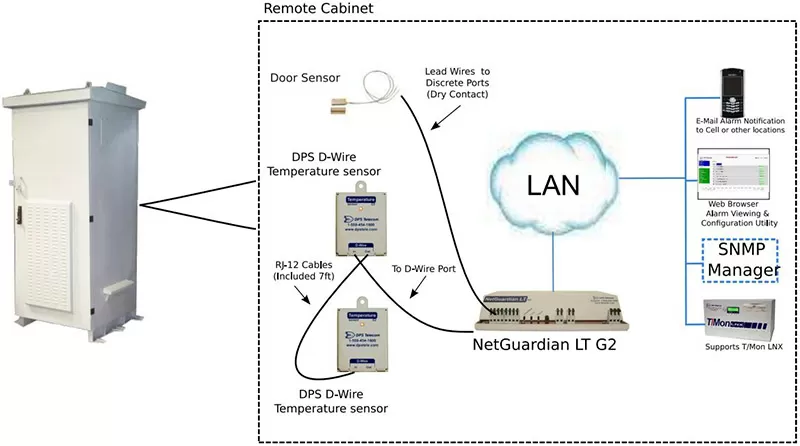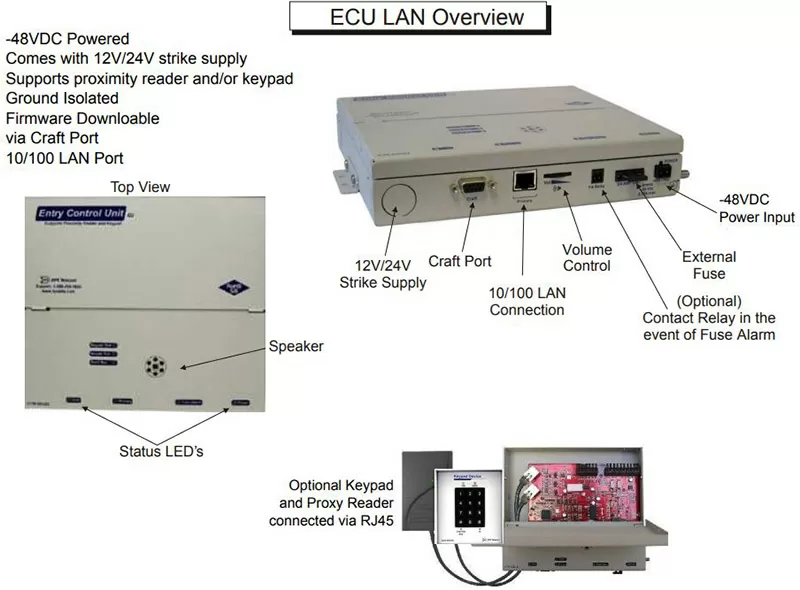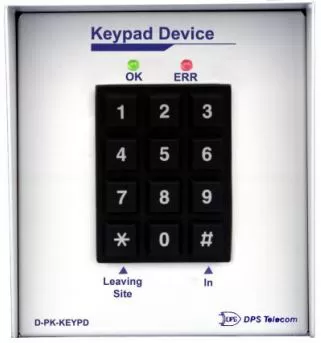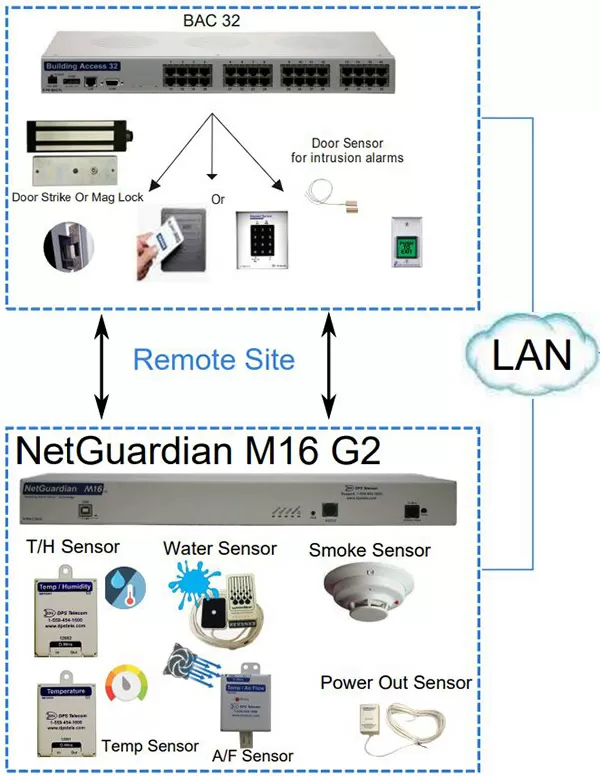Check out our White Paper Series!
A complete library of helpful advice and survival guides for every aspect of system monitoring and control.
1-800-693-0351
Have a specific question? Ask our team of expert engineers and get a specific answer!
Sign up for the next DPS Factory Training!

Whether you're new to our equipment or you've used it for years, DPS factory training is the best way to get more from your monitoring.
Reserve Your Seat TodayOf all the things you have to monitor at your remote sites, perhaps none are as simple and important as basic security. This essentially boils down to door, motion, and other sensors that detect intrusion. For example, you might wrap a fiber-optic cable through batteries and other important gear to detect attempted removal.
If you don't have any of these set up yet, your cheapest and most important first step is door monitoring. That's generally just a simple door contact switch, and it captures the majority of intrusions. It can also detect when your authorized employees prop a door open and forget to close it upon leaving the site.
To dig deeper into door monitoring, let's look at some recent proposals I've sent to my clients. As I write this in 2022, these proposal cover quite a range of years. Truthfully, so little has changed about door monitoring in the last decade that all of it applies equally today.

Thanks again for contacting us regarding your upcoming project. We are looking forward to monitoring your remote sites. Based on our correspondence / conversation, I understand that you need:
- An RTU (-48VDC) for monitoring an outdoor bay/cabinet at 5 sites.
- A door sensor and two temperature sensors with 3ft probes.
- The ability to monitor alarm statuses through a web browser
Based on your needs, I have prepared for you:
- NetGuardian LT G2: This is an effective and proven solution for monitoring outdoor cabinets. The NetGuardian LT G2 has the following key features:
- -48VDC powered with 4 discrete alarm ports and 1 D-Wire sensor port.
- A secure web browser for configuration and monitoring of alarm statuses.
- Industrial Temperature rated, for operating in temperature ranges of -22F to 158F (-30C to 70C), perfect for outdoor cabinet installs.
- Capable of reporting to the T/Mon LNX or any SNMP manager.
- Door Sensor: Magnetic contact which comes with 6ft leads
- DPS Temperature Sensor Node: Connects using the DPS D-Wire Sensor port, this sensor provides temperature readings from -40F to 180F (-40C to 82.2C). The D-Wire Sensors nodes allows you to daisy chain up to 16 sensor nodes, providing a flexible means of implementing additional monitoring points for expansion. Included with each sensor is one 7ft (RJ-12) cable.

Thanks again for contacting us regarding your Door Access Control Project. We have prepared this proposal to include pricing for the ECU LAN with Accessories of the same types ordered before for your remote site.
You can find full details about our solution in the "Technical Overview" and "Application Drawing" sections of the proposal.
Thanks again for contacting us regarding expanding your door management capabilities. We are looking forward to providing you with accessories for your Electromagnetic Lock. Based on your conversation with Tech Support, we have created this proposal for Door Position Sensor.
Door Position Sensor for ElectroMagnetic Lock S (Qty 1, 5, or 65, depending on whether you'd like to test one sensor, test a few, or tackle your entire project).
Thanks again for contacting us regarding your RFQ. We are looking forward to providing a monitor solution for your client. Based on your correspondence with DPS Telecom, we have prepared this proposal to include pricing for the NetGuardian 420, sensors and ECU.
By deploying the NetGuardian 420, you will continue to receive the following benefits:
- A built-in, user-friendly web browser, and no special software to load on your computer for configuring the device and view alarm status live.
- Having a Telco-Grade, multi-generational, US-manufactured RTU that is built specifically for this type of high-reliability operation to support your operations. Install the unit and let it do its job for the next 10-12 years.
By deploying our door management solution, you will immediately gain the following benefits:
- Saving time by giving contractors and technicians proxy cards, key codes, or remotely punching them in.
- Having a system that will maintain a log of when people enter and leave a location.
- Controlling who and when a person has access to your new facility.

As you've requested, I've quoted a replacement building access keypad for one that was recently damaged during a break-in attempt.
You will notice that the investment page features pricing tables based on the unit quantity purchased. For more information on the "Unit Quantity Discount" please reference the attached Discount Schedule.
Thanks again for contacting us contacting regarding your upcoming project with the metro rail authority. Based on your email request, we have prepared this proposal with information and pricing on the NetGuardian DIN & Accessories.
By deploying the Netguardian DIN, your client will continue to receive the following benefits:
- Maintain standardization with your clients other sites, no or minimum learning curve since the metro rail authority are already familiar with the Netguardian DIN.
- Having a Telco-Grade, multi-generational, US-manufactured RTU that is built specifically for this type of high reliability operation to support your operations. Install the unit and let it do its job for the next 10-12 years.
- Monitoring temperature, power, and other key environmentals so your client knows what's happening at their sites and who to send when trouble hits.
Please note the part number for NetGuardian DIN provide and the description provided had conflicting information. The RTU listed has an incomplete part number listed "D-PK-NetG-12017" there should be five letters for the location "NetG".
The part number "D-PK-NetG-12017" is also closer to a NetDog part number the metro rail authority has used heavily in the past "D-PK-NETDG-12017.00001". The core number for a NetGuardian DIN will be "D-PK NGDIN-" we have selected a NetGuardian DIN that the metro rail authority has used in the past that has a similar part number. If we are incorrect, please update us with the corrected information and we will revise this quote.

Door Sensor, Surface Mt Closed loop magnetic contact sensor.
Consists of magnet and contact. Gap distance, 5/8-inch. Screw mounted (screws included). Form A Contact. Contacts are held closed when magnet is within actuation range. Extended operating temperature range of -40C to 100C
Building Access System using Existing Human & Door Interfaces
I've now modified this proposal to remove the 4 doors associated with your "Wanama" site, as these will likely be the first doors to use our upcoming NFC readers.
I can confirm that your existing CAT-3 should be perfectly acceptable across any normal cable distance (several hundred feet, at least). We don't expect that you'll need to install new CAT-5 just to serve the new DPS access system. I'm having Engineering send you an email to reflect this.
Installing with RFID first and then transitioning to NFC readers creates no wasted purchasing, as you already have existing RFID readers. When our NFC readers are complete, you can phase them in easily.
After speaking with you, I understand that you need:
- A well-supported building access system that will replace your current "on the blink" server that is making you nervous.
- A clean interface for user management.
- Ideally, support for RADIUS (or Microsoft's NPS) to streamline user management.
- History reports for entry & exit log review.
- Compatibility with your existing HID card readers and door strikes.
- A migration path to NFC in the future.
The solution I've quoted here includes:
- Our proven, telco-grade building access hardware and T/Mon master station.
- Modern web interfaces (mainly in the T/Mon master, but also in the individual components) that Rochelle and others can use to manage user access and schedules.
- (We should have a meeting about RADIUS and Microsoft NFS. We have a concept that I think we can implement at little/no cost, but I want to make sure it matches what you're thinking.)
- Entry/exit log reporting (PDF export).
- Minimization of your install workload, because everything we hoped to reuse (HID card readers, door strikes) look to be 100% compatible with our Building Access System components. We'll verify this with an actual test prior to deployment.
- An apparent path toward NFC support in the future with a minimum of cost, as it appears that HID already manufactures NFC readers. These readers communicate over a wire in the same way that the proxy readers do (Wiegand protocol), so just a tiny amount of tweaking in our software would be required to support an "NFC user ID" concept instead of a proximity card serial number.
NOTE: I've assumed that you have -48v power at your door locations and prefer AC power for the central T/Mon server. If you need AC adapters for the door hardware, a DC-based T/Mon server, or a +24v or other DC voltage, please tell me.
Expanding Door Management for Main Office Remodeling
Thanks again for contacting us regarding your main office remodeling project. We are looking forward to providing you with additional equipment for your building access system. Based on your conversation with Ron, we have created this proposal to include information and pricing for the ECU G4 and Proxy Reader / Keypad Combo.
By deploying these accessories, you'll immediately gain the following benefits:
- With a keypad you will be able to save time by giving vendor / contractors key codes. Avoiding having to exchange keys or proxy cards, which means you're saving time by not driving to meet the vendor / contractors.
- Providing proxy cards for technician and engineer to make entry easier.
- Expanding which doors will maintain a log of when people enter and leave a location.
In this example, an Entry Control Unit is connected via RS485 to a NetGuardian RTU. The central T/Mon LNX is the administrator of codes, keys, and access permissions.Thanks again for contacting us regarding your upcoming renovation project. We are looking forward to providing you with a facility access solution. Based on your conversation with Ron, we have prepared this proposal to include pricing for the Proxy Card Reader, Magnetic Door Lock, and Proxy Key Fobs.
By deploying these accessories, you'll immediately gain the following benefits:
- Providing proxy key fobs for your employees to make entry easier.
- Expanding which doors will maintain a log of when people enter and leave a location.
- Providing a detailed record when anyone is at the site and send out an alarm notification.
- Having total remote control of who can enter a site and allow scheduling to provide when someone can enter using a keypad access, no keys required.
We have also included information on our Building Access 16 for your review to consolidate door management.
IP-Based Control of Remote PD Doors Proposal
Thank you again for contacting us regarding your upcoming project. After our call, I met with engineers here to determine precisely which of our boxes is best suited to the IP-based "alarm echo" application you need for your new police department. Based on their input, I've chosen 2 possible configurations:
Option A: Extra capacity and SNMP-to-relay capability
- It's built around the NetGuardian M16, a freestanding RTU that can be used for any standard remote monitoring application. You could, for example, send its alarm data to any SNMP manager in a typical monitoring situation.
- We'll wire your 12 radio contacts into the NetGuardian M16 (leaving 4 to spare). It will then direct its
- MP trap messages via IP to a second device at your new police station: the TrapRelay 32.
- The TrapRelay 32 (as our uncreative name implies) will respond to those SNMP traps by latching one of its corresponding relays (with 20 more left to spare for the future, which can be linked to any other SNMP-capable device in your network).
- In this way, your radio inputs will be "echoed" across IP to your new police department doors and other devices.
I like this solution because you get a very modern platform and lots of growth capacity. You can view contact-closure status in the web interface of the M16, and you can manually intervene by issuing controls in the TrapRelay's web interface. The SNMP-centric communication gives you a lot of flexibility for tying in other SNMP-based devices later.
Option B: End to End NetGuardian M16's
- We can also handle alarm echo with a pair of NetGuardian M16 units. They can form a symmetrical, bidirectional echo of 16 inputs on each side and 16 relays on each other side. Communication is via IP, but not the industry-standard SNMP protocol.
- This solution has a somewhat lower cost. Both of the M16 units can be re-purposed later as standalone remote-monitoring RTUs if desired, but the SNMP-to-relay function is not available.

Andrew Erickson
Andrew Erickson is an Application Engineer at DPS Telecom, a manufacturer of semi-custom remote alarm monitoring systems based in Fresno, California. Andrew brings more than 19 years of experience building site monitoring solutions, developing intuitive user interfaces and documentation, and opt...